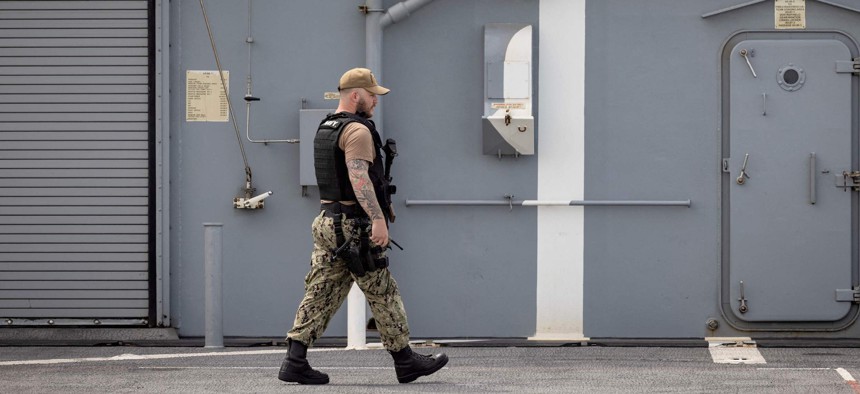
A member of the US Navy walks at the US navy's ship "Hershel Woody Williams" during the "African Lion" military exercise, on June 11, 2021, in Morocco's city of Agadir. FADEL SENNA / AFP
Navy Needs 'Champion' In Secretary Nominee Del Toro, Analysts Say
The service faces a tight 2022 budget and ship-buying concerns.
If Carlos Del Toro is confirmed as Navy secretary, he will take the helm of a service struggling to demonstrate to the Pentagon and the White House that it needs more money to confront an ambitious China and maintain its global presence, according to defense experts.
Del Toro was President Biden’s final service secretary pick, despite a national defense strategy that names China as the “pacing threat” and tasks the Navy to provide a constant presence in the Indo-Pacific region. The nomination delay has also left the nominee with no input in the Navy’s 2022 budget request, which was sent to Congress two weeks ago and has been panned by naval and defense supporters who say it calls for too few ships and lacks a sense of urgency about China’s military threat.
The treatment makes Del Toro and the Navy seem like an afterthought, said Chris Cavas, a naval commentator.
“If China is the threat—the pacing threat—one would think that the Navy would be an area where they would want to invest in, more than other areas. But this budget does not reflect that. And the delays in putting forth a nominee here don't say that either,” Cavas said.
Del Toro, a 1983 United States Naval Academy graduate who completed a career as a surface warfare officer before starting his own IT business, will have to be a “champion” for the Navy in order to get the Pentagon, White House, and Capitol Hill to understand the service’s concerns, Cavas said.
The need for a bigger Navy to address China and operate in the Indo-Pacific theater has bipartisan agreement, said Mark Cancian, a senior advisor of the International Security Program at the Center for Strategic and International Studies. Cancian worked with Del Toro in the early 2000s at the Cost Assessment and Program Evaluation office, or CAPE, when Del Toro was still in the Navy.
Reaching the 355-ship goal by 2030 will be a challenge for Del Toro because no affordable path or reasonable timeline was ever developed, Cancian said. The Biden budget also sets the Navy further back from that goal because too many ships are being retired—including some early, like littoral combat ships—and the request does not include funding for enough new ships to be built. The budget is too constrained to accomplish the larger fleet size the Navy desires, he said.
“The Navy has done that in the past: retired ships early to try to reinvest the money in more modern ships. But whenever they've done it, they've never been able to keep their size—the size has always got smaller. So that's going to be a tremendous challenge when Del Toro gets on board,” he said.
The Navy’s long-term shipbuilding future is also still opaque. The 30-year shipbuilding plan, which is meant to be submitted to Congress with the budget requests, was delayed for several months in 2020, and the newest plan is still at the White House, Politico reported.
With the tight 2022 budget and a smaller fleet size outlook, the Navy is feeling the tension of having to do too much at the same time: to both prepare to confront a technologically sophisticated China and to have enough ships to provide a global presence, Cancian said. That tension could cause a “strategy resources gap” to open up, he said, where the Pentagon’s strategy is asking too much of the Navy and the budget does not support what is demanded.
“There'll be a lot of strategic problems in that over time adversaries may come to believe that we're bluffing,” he said.







